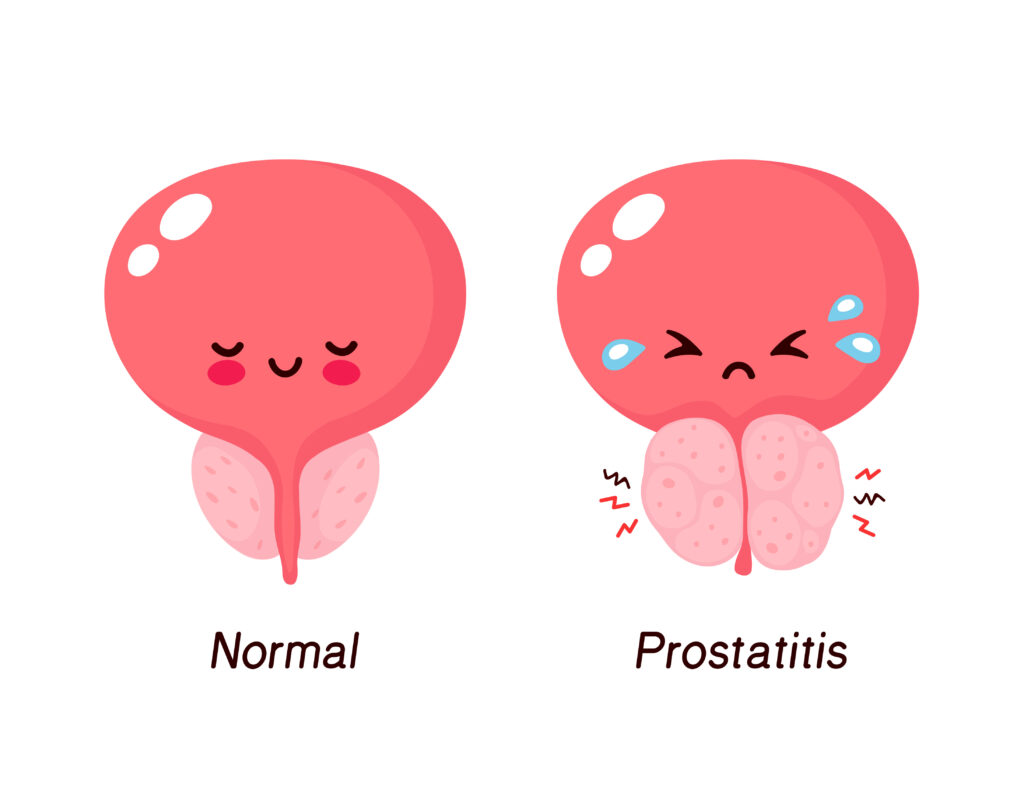
Prostatitis
Prostatitis is a common condition that may be caused by infection or inflammation of the prostate and sometimes the area around it. Studies suggest that as many as 10 percent of adult males suffer from prostatitis. There are several types of prostatitis, some men with prostatitis have a great deal of discomfort and pain, which may be in the pelvic area, testicles, or lower back. They may have pain when they urinate or ejaculate.
Some men develop chronic prostatitis that keeps coming back again and again. Although not all prostatitis can be completely cured, the symptoms can usually be managed with medical help.

What causes prostatitis?
Prostatitis from bacteria may be a result of a backward flow of urine into the prostate. This infected urine may be a result of a recent bladder infection or an abnormality of your urinary tract. Non bacterial prostatitis may be caused by other organisms. Non bacterial prostatitis is also thought to be from the nerves and muscles around the prostate not working correctly, and by causing too much tension at the outflow of the bladder and at the level of the pelvic floor. Also, the nerves in the area of the prostate may have become oversensitive over time, thus causing discomfort and pain in that area. As a result of the causes of non bacterial prostatitis being less well understood, diagnosis and treatment can be a frustrating experience for both the patient and the doctor.
How is prostatitis diagnosed?
Mr Zakikhani will ask you questions about the symptoms you have and are currently experiencing and about your medical history.
You will then be examined, including a digital rectal examination (DRE) to feel the prostate gland. A urine dipstick will be performed to see if there is any evidence of blood in the urine or of a urinary infection. Your PSA (prostate specific antigen) will be reviewed.
You may ask you to perform a flow test following this you will have a bladder scan, to see how much urine you leave in your bladder. You may also need to undergo a cystoscopy to examine the prostate and bladder further. A small telescope is inserted into the urethra after an anaesthetic gel is applied. This telescope allows the specialist to see your prostate and bladder, and see if there are any abnormalities or inflammation.
Click here to read our information leaflet about flexible cystoscopy
How is prostatitis treated?
Treatment of prostatitis depends very much on the cause.
Acute Bacterial Prostatitis
Antibiotics taken in a pill form can be effective when prescribed for up to a month. If a full course isn’t completed, it may result in the infection returning, or becoming a chronic problem. Analgesics or pain medications may be prescribed to relieve pain and discomfort.
Chronic Bacterial Prostatitis
This is also treated by antibiotics, but they are required for one to three months. Again, it is very important that you take the pills for the length of time prescribed by the doctor.
Chronic pelvic pain syndrome
This is not caused by bacteria, thus antibiotics will not help. Your doctor may try antibiotics, initially, however. Treatment of this condition is difficult, and many patients learn how to manage their symptoms. They may find that when they are stressed their symptoms return or worsen, and thus they need to try and learn relaxation techniques. Other triggering factors are mentioned below. The symptoms may wax and wane, or may just appear every few years or so.
A number of other treatments may be tried, and these include:
- tablets that relax the tissue of the prostate called alpha-blockers
- PDE% inhibitors
- anti-inflammatory pain killers (eg: ibuprofen or )
- tricyclic antidepressant tablets (eg: amitriptyline)
- prostatic massage, to help remove prostatic secretions
- physiotherapy, to help learn to relax the pelvic floor,
More natural methods to help symptoms might include:
- warm baths
- diet changes (avoid caffeine, alcohol, spicy or acidic foods)
- relaxation exercises
- frequent ejaculation
It may be that Mr Zakikhani refers you to the pain team and specialist physiotherapists to help manage this condition.
Please click here to complete a chronic prostatitis symptom score
Please click here to download our information leaflet
For more information on prostatitis the following sites may be helpful:
The British Prostatitis Support Association
The Prostatitis Foundation (US Based)
Please click here to complete a chronic prostatitis symptom score
